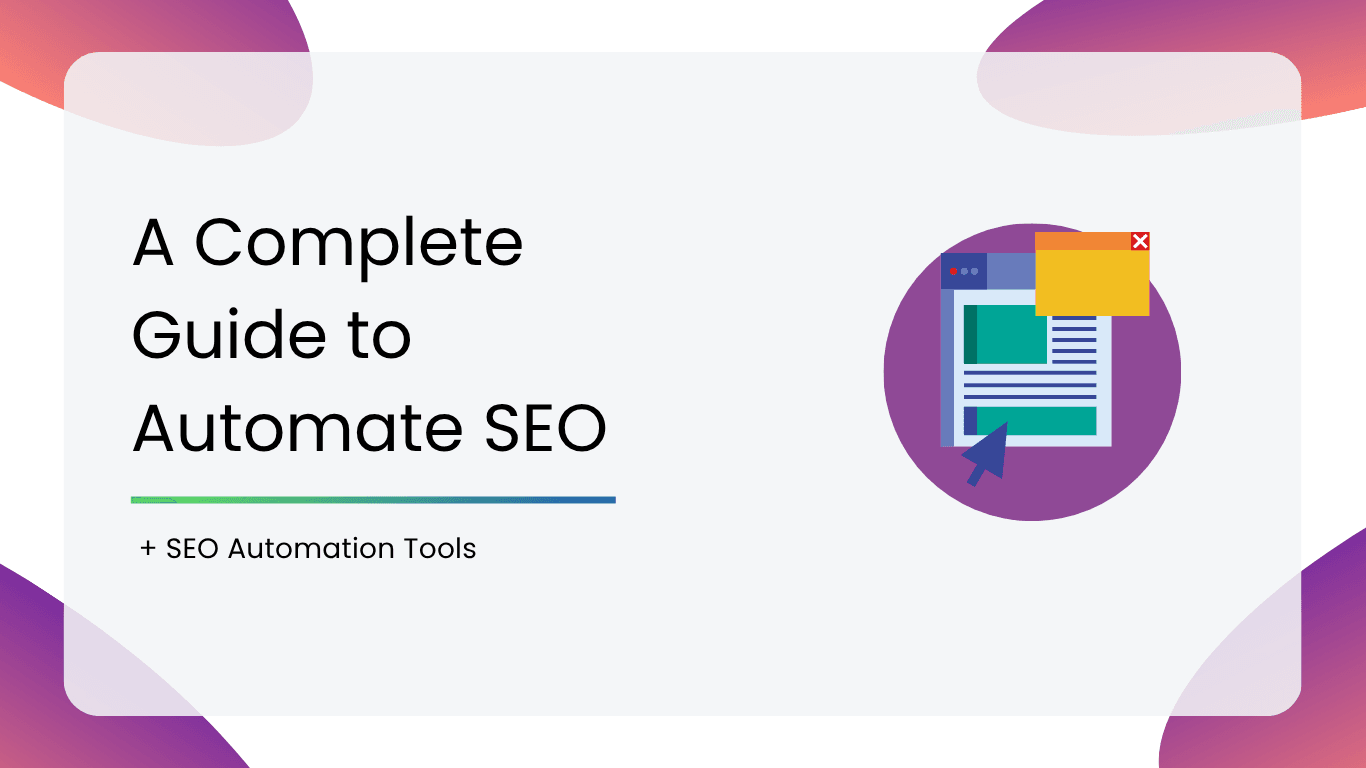Picture this: You’re sipping your coffee while an AI-powered tool scours the web for high-value backlink opportunities. Before you even finish your coffee, another bot has optimized your latest blog post, scheduled social shares, and even predicted its ranking potential. Sounds too good to be true? This is what happens when you automate SEO and let the machine handle the grunt work while you focus on strategy.
In this guide, we will help you turn your SEO process from a manual process to an automated growth machine.
What is SEO Automation?
SEO automation is the art of letting technology handle repetitive, data-heavy SEO tasks while you focus on the bigger picture. AI tools take care of your SEO tasks and let humans do what they do best, i.e., create, analyze, and innovate.
Further, we will learn about what SEO tasks can be automated, the benefits of automating, what to look for, and leave you with some of the best tools available in the market for SEO automation!
Top SEO Tasks You Can Automate
- Keyword Research & Rank Tracking: Stop guessing which keywords to target and let the AI tools analyze search trends, competition, and intent automatically. Advanced platforms track your rankings daily across all locations and devices. This alerts you to drops before they hurt your traffic. SEMrush and Ubersuggest are some of the great tools for keyword research and rank tracking.
- Technical SEO Audits: Imagine having a bot that crawls your site 24/7, and flags broken links, duplicate content, and mobile issues before even Google penalizes you for it. With the help of AI, SEO tools like Sitebulb can now automate audits and check schema markup, page speed, and indexation problems. This delivers fix-it-now reports while you focus on growth.
- On-Page Optimization: AI now writes meta tags, suggests internal links, and even grades your content’s SEO score as you type. Some of the AI tools, such as Frase.io and Surfer SEO, can even analyze top-ranking pages to recommend exact heading structures, keyword density, and semantic terms that you might be missing.
- Backlink Monitoring & Outreach: Automation tracks every new and lost backlink instantly, even scores their quality, and finds linkable assets in your content. These outreach tools, like Pitchbox and BuzzStream, are capable of personalizing emails all at scale, following up autonomously, and logging responses in your CRM. This cuts link-building time up to 70%.
- Competitor Analysis: There are spy tools such as Spyfu & Ahrefs available that can auto-update dashboards with rivals’ ranking keywords, content gaps, and backlink sources. These tools help you analyze your competitors.
- Content Optimization & AI Writing: Tools like GPT-4 and Claude can analyze your draft against the top 10 results. They even suggest real-time upgrades to help you optimize your content. Some tools are capable of rewriting weak sections or generating full drafts from bullet points.
- Brainstorm Topic Ideas: AI tools can also help brainstorm topic ideas for you, saving you time whenever there is writer’s block. Tools like Surfer SEO and ContentKing are great examples that showcase how much time and guesswork can be eliminated with smart automation.
Table of Contents
| 1. SEMrush |
| 2. Ahrefs |
| 3. SurferSEO |
| 4. Frase.io |
| 5. Jasper AI |
| 6. MarketMuse |
| 7. Copy.ai |
| 8. Pitchbox |
| 9. Brightedge |
| 10. Screaming Frog |
Best SEO Automation Tools
1. SEMrush
SEMrush is the most comprehensive all-in-one SEO platform that offers powerful tools for SEO tasks such as keyword research, competitor analysis, and site audits. Its AL-powered features help marketers optimize content, track rankings, and also uncover opportunities for growth across organic as well as paid channels.
Key Features:
- AI-Powered Keyword Research: Provides intelligent keyword suggestions with search volume, difficulty, and trend data.
- Comprehensive Site Audit: Identifies technical SEO issues with prioritized action items for fixes.
- Competitor Analysis Matrix: It also reveals competitors’ top-performing keywords, ads, and backlinks.
- Content Optimization Toolkit: SEMrush offers templates and real-time suggestions for improving on-page SEO.
- Rank Tracking: Monitors keyword positions across locations with historical performance data.
Pros:
- SEMrush is the most complete all-in-one SEO platform covering all aspects of digital marketing.
- Exceptionally accurate and has a frequently updated database.
- Excellent for agencies managing multiple client campaigns.
- It also has robust reporting features with white-label options.
Cons:
- Might have a steeper learning curve due to the feature overlord for beginners.
- Higher pricing tier compared to niche-specific tools makes it less affordable for small businesses.
- The backlink database is not as comprehensive as Ahrefs.
Review
This is the most complete SEO toolkit available, though the sheer number of features can be intimidating at first. It is ideal for serious marketers who need reliable data across all SEO disciplines. Totally worth the investment if you use its full capabilities.
2. Ahrefs
Ahrefs is the gold standard for backlink analysis, boasting the freshest and accurate link index in the industry. Beyond this, it offers keyword research, content gap analysis, and technical SEO auditing tools in a well-streamlined interface.
Key Features:
- Industry-Leading Backlink Index: Maintains the most up-to-date link database, which is refreshed every 15-30 minutes.
- Content Gap Analysis: Identifies ranking opportunities by comparing your content with competitors.
- Keyword Explorer: Provides accurate difficulty scores and click potential metrics.
- Site Health Checker: It is a technical audit tool with visual prioritization of issues.
- Rank Tracker: Also tracks keyword movements with historical SERP snapshots.
Pros:
- It has unmatched backlink analysis capabilities.
- Better intuitive interface for core SEO tasks compared to SEMrush.
- Offers reliable data with fewer “Ghost” or spammy backlinks reported.
- Excellent for reverse-engineering competitor strategies.
Cons:
- The tool lacks integrated content features.
- It offers limited capabilities for PPC and social media analysis.
- There is no built-in AI writing assistance.
Review
Ahrefs sets the industry standard for backlink analysis while offering excellent keyword research tools. It is more focused than SEMrush, with a cleaner interface that many users prefer. Their data updates faster than most competitors.
3. SurferSEO
SurferSEO is a data-driven content optimization tool that helps writers craft high-ranking articles by analyzing top-performing pages. Its real-time editor evaluates content structure, keyword usage, and readability against SERP competitors. This provides specific improvement recommendations. It is perfect for content teams and bloggers.
Key Features:
- Content Editor with Real-Time Grading: Scores content against top SERP competitors as you write.
- SERP Analyzer: Reveals optimal content structure, length, and keyword density for target queries.
- AI-Generated Outlines: Creates data-driven content briefs based on top-ranking pages.
- NLP Keyword Suggestions: Recommends semantically related terms to boost topical relevance.
- Audit Tool: It also evaluates existing content and suggests specific improvements.
Pros:
- The most scientific approach to on-page optimization is available.
- Offers seamless Google Docs integration for collaborative editing.
- It helps create perfectly structured content for featured snippets.
- The tool continuously updates its algorithm based on Google changes.
Cons:
- Purely focused on content, and there are no backlinks or rank tracking features.
- Requires strong writing skills and doesn’t generate complete articles.
- The tool is less valuable without complementary keyword research tools.
Review
This is a game-changer for content optimization that takes the guesswork out of on-page SEO. It doesn’t write content for you, but it provides incredibly valuable structure and keyword guidance. Best used alongside human writers.
4. Frase.io
Frase.io is an AI-powered content research and optimization tool that is designed to help marketers create high-quality, SEO-friendly content efficiently. It analyzes top-ranking pages for any keyword and generates detailed content briefs along with key questions, headings, and statistics to include. This tool is ideal for content teams who are looking to streamline research and make sure their articles meet search intent.
Key Features
- AI-Generated Content Briefs: Frase.io creates comprehensive outlines based on top SERP competitors.
- Automated Research: Extracts key questions, headings, and data from high-ranking pages.
- Content Optimization: It also provides real-time SEO scoring and improvement suggestions.
- Answer Engine: Identifies common user questions in order to enhance FAQ sections.
Pros
- Speeds up content research and brief creation.
- It also helps optimize content for feature snippets and voice searches.
- Offers a very user-friendly interface that also offers Google Docs integration.
Cons
- Limited capabilities for long-form content generation.
- Requires manual writing. There are no full AI-generated drafts.
- Less robust for technical SEO compared to all-in-one tools.
Review
Frase.io streamlines your content research and brief creation beautifully. While it won’t replace your writing team, it dramatically cuts preparation time. It offers simplicity with powerful features.
5. Jasper AI
Jasper AI is a versatile AI writing assistant that helps marketers generate high-quality, SEO-optimized content quickly. From blog posts to ad copy, Jasper uses advanced language models to produce human-like text based on brief inputs only. It supports brand voice customization and integrates with SurferSEO for data-driven optimization.
Key Features
- AI-Powered Writing: Generates blog posts, product descriptions, and ad copy in seconds.
- SEO Mode: Optimizes content for keywords with SurferSEO integration.
- Brand Voice Customization: The tool learns and mimics your brand’s tone and style.
- 50+ Templates: Supports various content formats, from emails to social posts.
Pros:
- Saves time on content creation with fast, high-quality drafts.
- It also helps overcome writer’s block with creative suggestions.
- The tool easily integrates with SEO tools for optimization.
Cons:
- The outputs might require heavy editing for accuracy and depth.
- There is no built-in rank tracking or backlink analysis.
- Subscription costs add up for frequent users.
Review
Jasper is a versatile writing assistant that is particularly strong for marketing copy and content ideas. The output it gives out requires careful review, but it’s excellent for overcoming blank-page syndrome.
6. MarketMuse
MarketMuse is an AI-driven content strategy platform that helps businesses plan, optimize, and scale their content for maximum SEO impact. It uses machine learning to analyze content gaps, recommend topics, and predict performance based on competitor data. It is ideal for enterprise teams and excels at building topical authority through data-backed content clusters.
Key Features:
- Content Planning: Identifies gaps and opportunities in your content strategy.
- AI-Generated Briefs: Provides data-driven outlines for high-ranking potential.
- Topic clustering: Helps build topical authority through related content.
- Performance Forecasting: The tool predicts content success before publishing.
Pros:
- Offers deep content insights for long-term SEO growth.
- Excellent for enterprise-level content teams.
- It greatly reduces guesswork with predictive analytics.
Cons:
- It might be expensive for small businesses or solo marketers.
- Overkill for simple blogs or short-form content.
- There is a steep learning curve for beginners.
Review
MarketMuse is a sophisticated content strategy software that is best suited for large content teams. It provides exceptional competitive insights if you can handle its complexity and cost.
7. Copy.ai
Copy.ai is an AI-powered writing assistant that is designed to help marketers quickly generate high-converting copy for ads, emails, and web content. It uses GPT technology to create human-like text based on simple prompts. This makes it ideal for teams needing fast, creative content.
Key Features
- 90+ Templates: Generates everything from product descriptions to cold emails.
- AI Blog Post: Creates long-form content outlines and drafts.
- Brand Voice Customization: Learns your tone for consistent messaging.
- Multi-Language Support: It is capable of writing in 25+ languages.
Pros
- Extremely user-friendly with a minimal learning curve.
- It is much more affordable than other AI writing tools.
- Excellent for brainstorming and overcoming writer’s block.
Cons
- There are no built-in SEO optimization features.
- The quality varies and requires careful editing.
- It has limited capabilities for complex content strategies.
Review
Copy.ai is a user-friendly AI writing tool that is perfect for small businesses needing quick copy. Though it is more limited than Jasper, but easier to use and more affordable.
8. Pitchbox
Pitchbox is a powerful outreach automation platform that is designed for SEO and PR professionals who are running large-scale link-building campaigns. It streamlines the entire outreach process from prospect discovery to follow-up emails and performance tracking. It helps teams scale their link acquisition while maintaining high response rates.
Key Features
- Automates Prospect Research: The tool helps find relevant link opportunities.
- Smart Email Sequences: Personalizes outreach at scale.
- CRM Integration: It tracks all communication in one place.
- Performance Analytics: It measures campaign success metrics.
Pros:
- Helps you save hundreds of hours on manual outreach.
- Offers excellent deliverability and response rates.
- It has comprehensive campaign management features as well.
Cons:
- It might be expensive for small businesses.
- Requires time to set up effective campaigns.
- There is a steeper learning curve than basic tools.
Review
This is the most professional outreach automation platform for serious link builders. Setup requires effort, but the time savings for ongoing campaigns are tremendous. However, it might be overqualified for casual users.
9. BrightEdge
BrightEdge is an enterprise-level SEO platform that combines AI-powered insights with comprehensive rank tracking and content optimization tools. Designed for large organizations, it provides predictive analytics to help teams stay ahead of algorithm changes and competitor movements. BrightEdge stands out for its sophisticated data science approach to SEO.
Key Features:
- AI-Powered Recommendations: It suggests optimization opportunities
- Predictive Analytics: It helps forecast content performance
- Competitor Benchmarking: It tracks rivals’ SEO strategies
- Universal Search Monitoring: It also tracks rankings across the web, images, and video
Pros:
- The most advanced enterprise SEO solution available
- An excellent option for global brands with complex needs
- Has robust forecasting and predictive capabilities
Cons:
- The tool is very expensive – pricing starts at enterprise levels
- It requires a dedicated team to fully utilize
- It might be overkill for small-to-medium businesses
Review
This is an enterprise-grade solution with powerful predictive capabilities. The only downside of the tool is that it only makes financial sense for large organizations with dedicated SEO teams.
10. Screaming Frog
Screaming Frog is a powerful desktop-based website crawler that helps SEO professionals conduct deep technical audits and uncover optimization opportunities. Unlike cloud-based tools, it crawls websites directly from your computer and offers greater control and privacy for sensitive projects. While its interface appears basic, it delivers enterprise-grade crawling capabilities at a fraction of the cost of premium platforms.
Key Features:
- Lightning-Fast Crawling: Processes thousands of URLs in minutes
- Comprehensive Technical Audits: Flags broken links, duplicate content, and redirect chains
- Custom Extraction: Pulls specific data like metadata, headings, or structured data
- Integration Friendly: The tool works with Google Analytics, Search Console, and APIs
- Visualizations: It also creates interactive sitemaps and graphs of the site architecture
Pros:
- There is a one-time fee and no recurring subscription.
- Handles JavaScript-rendered pages effectively.
- Offers unlimited crawls on the paid version.
- It is ideal for large-scale enterprise sites.
Cons:
- There is a steep learning curve for beginners
- There are no built-in AI recommendations or automation.
- It is desktop-only, and no cloud version is available.
- The basic interface feels outdated.
Review
This is the most reliable website crawler available. Technical SEO specialists swear by its accuracy, though the interface feels dated. It offers unbeatable value with its one-time license.
What to Look for When Choosing an SEO Automation Tool?
- Core Functionality & Specialization: Choose a tool that excels in your priority areas, whether it’s keyword research, backlink analysis, or just content optimization. Avoid high-end tools if you need deep expertise only in one area. Make sure the tool covers basics like rank tracking and technical audits if you need an all-in-one solution.
- AI & Automation Depth: Always look for tools that go beyond basic automation with smart features such as predictive rankings, content gap analysis, or auto-generated optimization suggestions. Avoid tools that merely aggregate data without actionable insights.
- Data Accuracy & Updates: Prioritize tools with a frequently updated database and metrics that can be relied upon. Check if historical data is available to track trends.
- Usability & Integration: The tool should fit your team’s workflow, whether it’s a simple Chrome extension or an enterprise platform. Always test the interface during free trials and make sure it integrates with your CRM, Google Analytics, or other critical tools.
- Budget vs. ROI: Assess whether the tool’s cost aligns with your expected time savings and results. Watch for hidden costs and prioritize tools that offer scalable plans.
Benefits of Automating SEO
- Time Savings & Frequency: Automating repetitive SEO tasks like rank tracking, site audits, and reporting frees up hours in your workflow. Instead of manually checking backlinks or updating meta tags, tools like Ahrefs and SEMrush handle these in minutes.
- Data Driven Accuracy: AI-powered tools analyze vast datasets to spot trends that humans might miss. SurferSEO and MarketMuse use machine learning to optimize content with precision, reducing guesswork.
- Scalability & Consistency: Automation makes sure that tasks like technical audits or content optimizations are applied uniformly across thousands of pages. Tools like Screaming Frog crawl entire sites flawlessly, while tools like Pitchbox manage outreach at scale without even sacrificing personalization.
- Proactive Problem-Solving: Automated alerts flag issues in real time. This lets you fix them before they impact rankings. Tools like Brightedge even predict algorithm shifts. This helps you stay ahead of competitors.
Conclusion
From AI writing your first drafts to bots outmaneuvering competitors in the SERP shadows, these tools are not only saving time, but they are also rewriting the rules of the game. The question isn’t whether to automate, but how fast you can harness it before your competition does.
The future of SEO isn’t coming – it’s already here. The only question is: Are you driving the algorithms, or is it driving you?
If you liked this blog, you’ll love some of our other deep dives into the world of AI and marketing:
- Best AI SEO Tools & How to Use Them
- Generative AI for SEO
- Best AI Keyword Research Tools in 2025
- Top AI Tools for Digital Marketing (Free & Paid)
FAQs
Priority tasks for automation include:
– Rank tracking (SEMrush, Ahrefs)
– Technical site audits (Screaming Frog)
– Backlink monitoring (Ahrefs, Majestic)
– Content optimization (SurferSEO, Frase)
– Reporting (Google Data Studio integrations)
Follow these best practices:
– Maintain 60-70% human editing of AI content
– Add unique examples and case studies
– Focus on EEAT (Experience, Expertise, Authority, Trustworthiness)
– Use plagiarism checkers
The “set it and forget it” mentality. Effective automation requires:
– Regular performance reviews
– Human quality checks
– Strategy adjustments based on results
Most connect with:
– Google Analytics
– Google Search Console
– CMS platforms
– CRMs
API access varies by tool.





